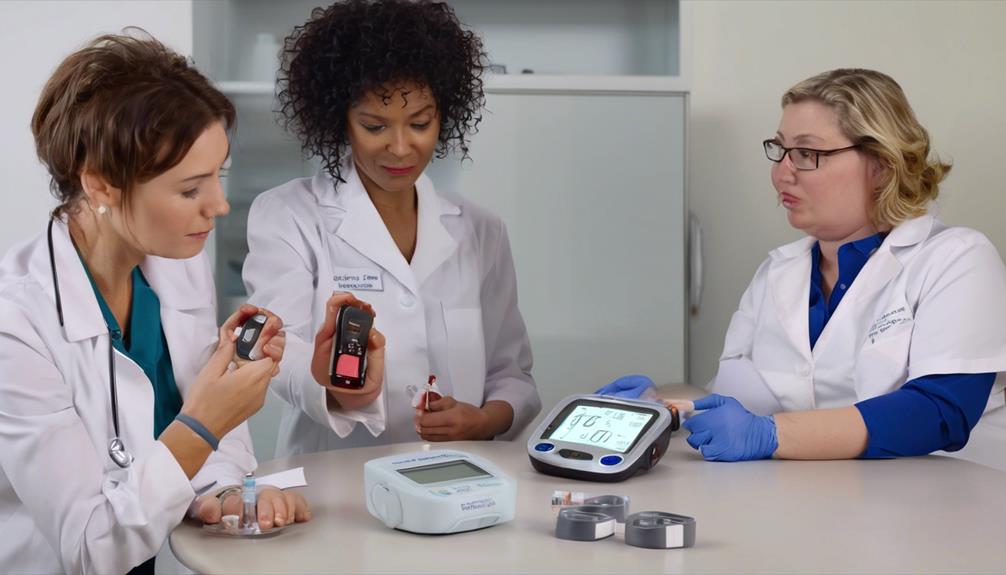In the realm of diabetes management, it is crucial to emphasize the significance of understanding medication safety. Picture a situation where a small error in medication names results in a risky decrease in blood sugar levels. The repercussions could be serious.
Understanding the nuances of diabetes medications and their potential risks is just the tip of the iceberg. But what other crucial aspects of medication safety in diabetes management might we need to consider?
Let's explore together how proper training and awareness can make a significant impact on the well-being of individuals navigating this complex condition.
Key Takeaways
- Understand medication risks to prevent complications.
- Engage patients in medication discussions for safety.
- Regular blood sugar monitoring is crucial for control.
- Referral to Diabetes Education Services empowers self-care.
Understanding Diabetes Medication Risks
When managing diabetes, it's crucial to understand the potential risks associated with different medications used in treatment. For patients with diabetes, maintaining optimal blood glucose levels is paramount. However, certain medications like SGLT2 inhibitors can increase the risk of diabetic ketoacidosis, even if blood glucose levels seem normal. Additionally, concentrated insulin formulations such as Humulin R U-500 may pose a higher risk for adverse effects, emphasizing the need for careful monitoring and dosage adjustments.
Renal function plays a vital role in diabetes management, especially when considering medications like metformin. Individuals with renal impairment face an increased risk of lactic acidosis when taking metformin. Understanding these risk factors associated with diabetes medications is crucial for patients to make informed decisions about their treatment plans.
Proper education and awareness can help mitigate risks such as hypoglycemia and ensure safe and effective management of diabetes.
Coordinated Care for Diabetes Management

To enhance diabetes management, collaborative drug therapy management involving pharmacists significantly improves glycemic control in individuals with diabetes. Pharmacists play a vital role in coordinating care for diabetes management by reviewing medications, educating patients, and ensuring effective treatment plans. It is essential for patients with type 2 diabetes to understand the impact of their medications on blood glucose levels and overall health. Regularly updating and reviewing medication lists with pharmacists can reduce the risk of adverse events and enhance clinical outcomes.
| Role of Pharmacists in Coordinated Diabetes Care | Benefits |
|---|---|
| Medication review and education | Improved glycemic control and reduced risks |
| Coordinating care with healthcare providers | Enhanced clinical outcomes and patient satisfaction |
| Referral to Diabetes Self-Management Education | Comprehensive diabetes management support |
Ensuring effective coordination of care, especially through the involvement of pharmacists, can lead to better management of diabetes and overall well-being for patients. Referring individuals to Diabetes Self-Management Education and Support services can provide valuable resources for both clinical and emotional support in managing diabetes.
Questioning Patients About Their Medicines
Inquiring with patients about their medicines plays a crucial role in ensuring proper understanding, adherence, and safety in medication management.
When discussing medications with patients, it's essential to:
- Help patients with type 2 diabetes understand the importance of insulin therapy and how it affects their blood sugar levels.
- Identify potential adverse events or side effects related to the prescribed medications to proactively address them.
- Educate patients about medication interactions to prevent any harmful effects on their diabetes care regimen.
Monitoring Blood Levels for Health
Regularly monitoring blood glucose levels is essential for individuals managing diabetes to ensure optimal control and prevent episodes of low blood sugar. Keeping track of blood sugar levels helps in making informed treatment decisions and adjusting lifestyle choices accordingly. The frequency of checking blood glucose levels can vary, with some individuals needing to monitor multiple times a day while others may only need periodic checks throughout the day. Understanding the patterns of blood sugar fluctuations is crucial as it aids in adjusting medication, diet, and physical activity to maintain optimal glucose control. It is important to recognize the symptoms of low blood sugar, known as hypoglycemia, which can occur when blood glucose levels drop below 70 mg/dL. Symptoms of hypoglycemia include shakiness, sweating, and confusion. By monitoring blood glucose levels regularly, individuals with diabetes can take proactive steps to prevent low blood sugar episodes and manage their condition effectively.
| Benefits of Monitoring Blood Levels | ||
|---|---|---|
| Helps in making informed treatment decisions | Aids in adjusting lifestyle choices | Prevents low blood sugar episodes |
| Assists in medication adjustment | Recognizes symptoms of hypoglycemia | Manages blood sugar fluctuations |
Referral to Diabetes Education Services
Joining Diabetes Education Services is a crucial step towards comprehensive management and understanding of diabetes. These services offer personalized education plans tailored to individual needs and goals, focusing on medication management, blood sugar monitoring, complications prevention, and lifestyle modifications. Referral to Diabetes Education Services not only enhances medication adherence but also empowers individuals to take charge of their health through improved self-care practices.
- Individuals benefit from comprehensive diabetes management strategies.
- Education programs aid in preventing complications associated with diabetes.
- Patients are equipped with the knowledge and skills necessary for effective self-management.
Frequently Asked Questions
What Is the Diabetic Protocol for Low Blood Sugar?
When facing low blood sugar, the diabetic protocol involves consuming fast-acting carbs like glucose tablets, juice, or candy. Severe cases may require glucagon injections if the person is unconscious. It's crucial to recheck blood sugar levels afterward.
Having a glucagon kit for emergencies is stressed. Timely recognition and treatment are vital for safety and to prevent complications.
What Action to Take for Diabetes and Low Blood Sugar?
When dealing with diabetes and low blood sugar, our immediate action should be to consume fast-acting carbs like glucose tablets, juice, or candy.
In severe cases where oral intake isn't possible, glucagon injections can help.
After treating low blood sugar, it's crucial to recheck levels to ensure they return to normal.
Educating loved ones about managing low blood sugar emergencies is vital for proper support and care.
How Do You Care for Someone Having a Diabetic Emergency With Hypoglycemia Low Blood Sugar )?
If someone experiences a diabetic emergency with hypoglycemia (low blood sugar), we should act quickly. Provide fast-acting sugar sources like glucose tablets, fruit juice, or regular soda.
Monitor closely for symptoms such as confusion, sweating, shakiness, or dizziness. If unconscious or unable to swallow, administer glucagon injection as directed.
After stabilizing blood sugar, offer a snack with protein and carbs. If there's no improvement, contact emergency services promptly.
Can You Train With Low Blood Sugar?
We shouldn't train with low blood sugar as it can impair both mental and physical abilities, increasing the risk of accidents and injuries. It's crucial for individuals with diabetes to maintain stable blood sugar levels before and during exercise.
Proper monitoring of blood sugar levels is essential for safety and optimal performance. Training with low blood sugar can affect energy levels, focus, and overall workout effectiveness.
It's best to prioritize stable blood sugar levels for safe and effective training.
Conclusion
In conclusion, medication safety training is essential for managing diabetes and low blood sugar effectively. Are we truly taking the necessary steps to ensure our health and well-being?
By staying informed, working closely with healthcare providers, and actively monitoring our blood sugar levels, we can take control of our medication management and overall health.
Remember, our actions today will impact our future health outcomes. Let's prioritize our medication safety and make positive choices for our diabetes management journey.









